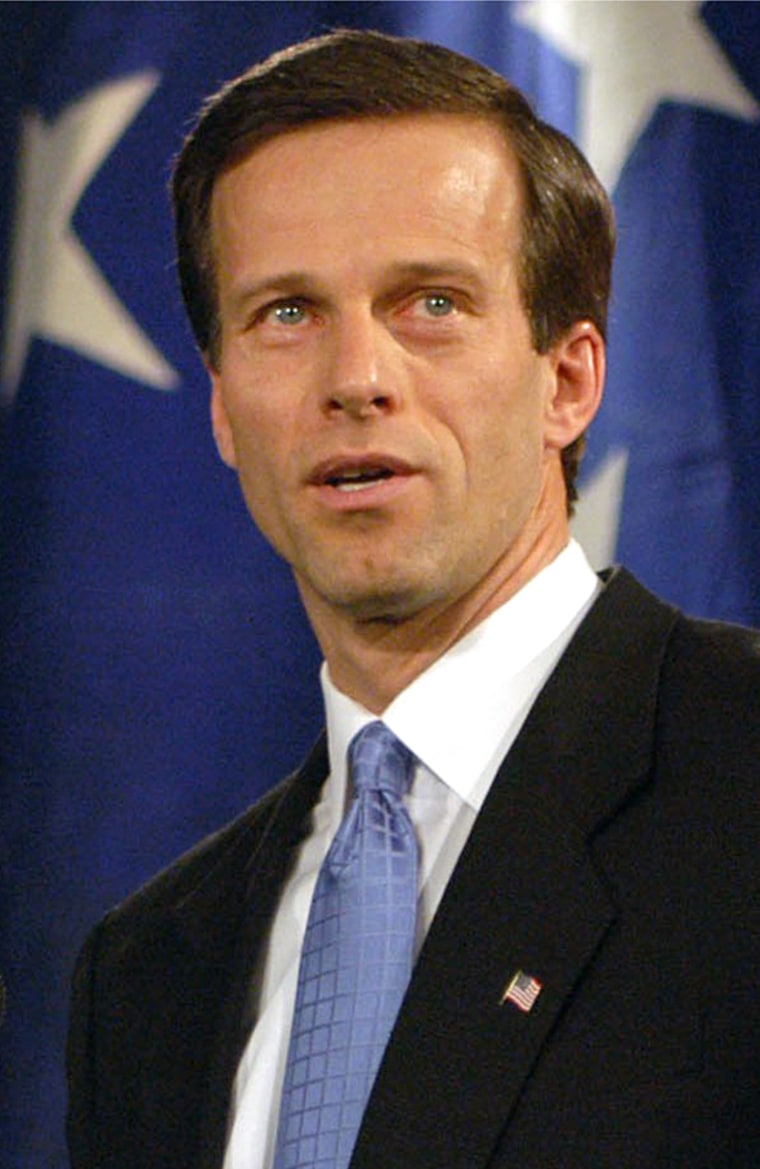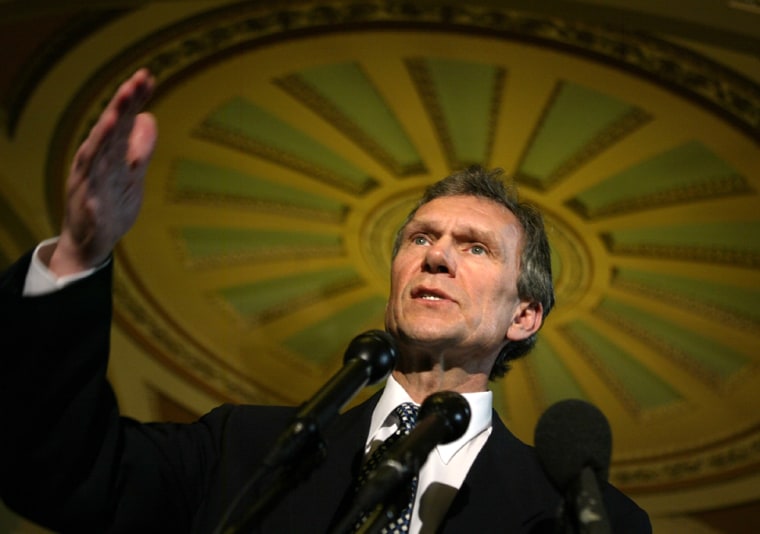Democrats might be jittery about their chances of winning the White House, or even discouraged about their uphill battle to take back the U.S. House. But lately, when it comes to regaining control of the Senate, the math has allowed them to crack a smile — that is, until a new poll from South Dakota was released on Wednesday.
Ever since Republican Sen. Ben Nighthorse Campbell of Colorado decided not to run for re-election in March, Democrats have been able to diagram a plausible scenario of how they can take back the Senate, where Republicans hold a 51-49 advantage. (Independent Jim Jeffords of Vermont sides with the Democrats.) They like their odds of picking up current GOP seats in Alaska, Colorado, Illinois, and Oklahoma. They even have a good chance of holding onto the seats in Florida, Louisiana, North Carolina, and South Carolina — something that seemed unlikely after Democratic Sens. Bob Graham, John Breaux, John Edwards, and Fritz Hollings announced they weren’t running for re-election in those states.
Still, to win back the Senate, analysts say Democrats will most likely need to win seven out of these eight races (or six, if Kerry wins the White House and gets to use his vice president to break the 50-50 tie). Such a task won’t be easy, but Democrats are starting to like their chances. “The momentum, mood, and movement in the map has continued in our direction,” Sen. Jon Corzine, D-N.J., chairman of the Democratic Senatorial Campaign Committee, said in a conference call on Wednesday. “We believe we can take the Senate back.”
As Daschle goes, so goes the Senate?
But that task becomes much more difficult — maybe next to impossible — if their leader, Sen. Tom Daschle of South Dakota, can’t win his re-election bid. And according to a new poll, Daschle seems to be in the fight of his political life. A local Sioux Falls Argus Leader/KELO-TV survey released on Wednesday shows Daschle ahead of GOP challenger and former congressman John Thune, 49 percent to 47 percent. Back in February, that same poll showed Daschle leading Thune, 50 percent to 43 percent.
“I think this race is going to be as close as they come,” said Jennifer Duffy, who monitors Senate races for the nonpartisan Cook Political Report. “There is no reason to believe it will be any different from the 2002 race,” in which South Dakota’s other senator, Democrat Tim Johnson, defeated Thune by only 524 votes.
Analysts have offered a few reasons why this race has narrowed, such as negative third-party ads criticizing Daschle, and the fact Republicans in this GOP-tilting state might be going back to their usual voting patterns with a competitive special congressional election in the state that takes place on June 1.

Thune’s campaign manager, Dick Wadhams, cautions against overstating the poll’s significance because it’s almost within the margin of error of the February survey. What is significant, he says, is that Daschle has spent nearly $7 million in this race and has been running TV advertisements since last July, while Thune has yet to run a single ad. So after spending all of that money and running all of those ads, Wadhams argues, Daschle “has not made a dent in this race.”
Which poll to trust?
Yet exactly how close this race is may depend on whose polls you trust. On Monday, in advance of the Argus Leader/KELO survey, the Daschle campaign released its own internal poll, which showed the senator leading Thune, 55 percent to 42 percent. But Republicans aren’t buying those figures. “I think they pulled those numbers out of thin air,” Wadhams said. “This is not a 13-point race, and they know it.”
Dan Pfeiffer, Daschle’s spokesman and deputy campaign manager, fired back. “I have seen tons of polling, and I have never seen it below eight [points] for the past two months,” he said. “I don’t think that there is anyone who is better at polling the state of South Dakota than [Daschle pollster] Al Quinlan.”
Regardless of whose poll numbers are right, however, Daschle has advantages and disadvantages that he carries into the race. And whether he wins or loses will depend on which of the these factors plays the biggest role. On the plus side is his status as the Democratic leader of the Senate, a position he has used to deliver projects and other goodies to South Dakota. “This is going to come down to a question about whether people think John Thune’s values are more important than Tom Daschle’s ability to deliver for the state,” Daschle campaign manager Steve Hildebrand said in a March interview. “And it’s a contest we’ll win.”
In fact, the new Argus Leader/KELO poll found that 32 percent of South Dakotans believe that Daschle’s leadership post makes them more likely to vote for him, compared with 12 percent who say it makes it less likely. Moreover, the poll notes that even 15 percent of Republicans say they will vote for Daschle; however, that GOP support was at 21 percent in the February poll. (Daschle’s own survey, though, shows that GOP support to be at 29 percent.)
Another Daschle advantage is his campaign’s formidable get-out-the-vote operation. As it turns out, Daschle’s campaign team — Hildebrand and Pfeiffer — is the same team that helped pull off Johnson’s 524-vote win over Thune in 2002, primarily by mobilizing heavily Democratic Native-American voters from South Dakota’s reservations. “They know how to put the ground game together, and Thune didn’t do it well in 2002,” said Duffy of the Cook Political Report.
Talking up the ground game
Pfeiffer adds that he expects that Daschle will go into Election Day with a lead, but even if he’s trailing Thune by a few points, he can still pull off the win because the campaign’s ground game is so impressive. “That’s the kind of operation we are running.”
Nevertheless, there are some dangers that are lurking for Daschle. Besides being unable to pull away from Thune after spending all that money (if you buy the new Argus Leader poll), Daschle faces a South Dakota that is overwhelmingly Republican, and Thune might be able to grab onto Bush’s coattails there in the November election.
Wadhams also points out that Daschle has truly never been challenged before, and that a tight race could highlight some of his apparent inconsistencies of representing the Red state of South Dakota while also leading the Democratic Party. For example, he says, Daschle strikes a pro-gun pose while in South Dakota, but is pro-gun control when in Washington. “He’s gotten away with it for 18 years because he was not challenged very successfully in his previous races,” he said. “This time, he’s isn’t going to be able to get away with it.”
Or will he? Despite these disadvantages, the Daschle camp remains confident they will come out ahead on Election Day. “It’s going to be a hard race,” Pfeiffer said. “[But] at the end of the day, Tom Daschle is going to win.” Democrats trying to take back the Senate certainly hope he’s right.
Washington-based Mark Murray covers politics for NBC News.
